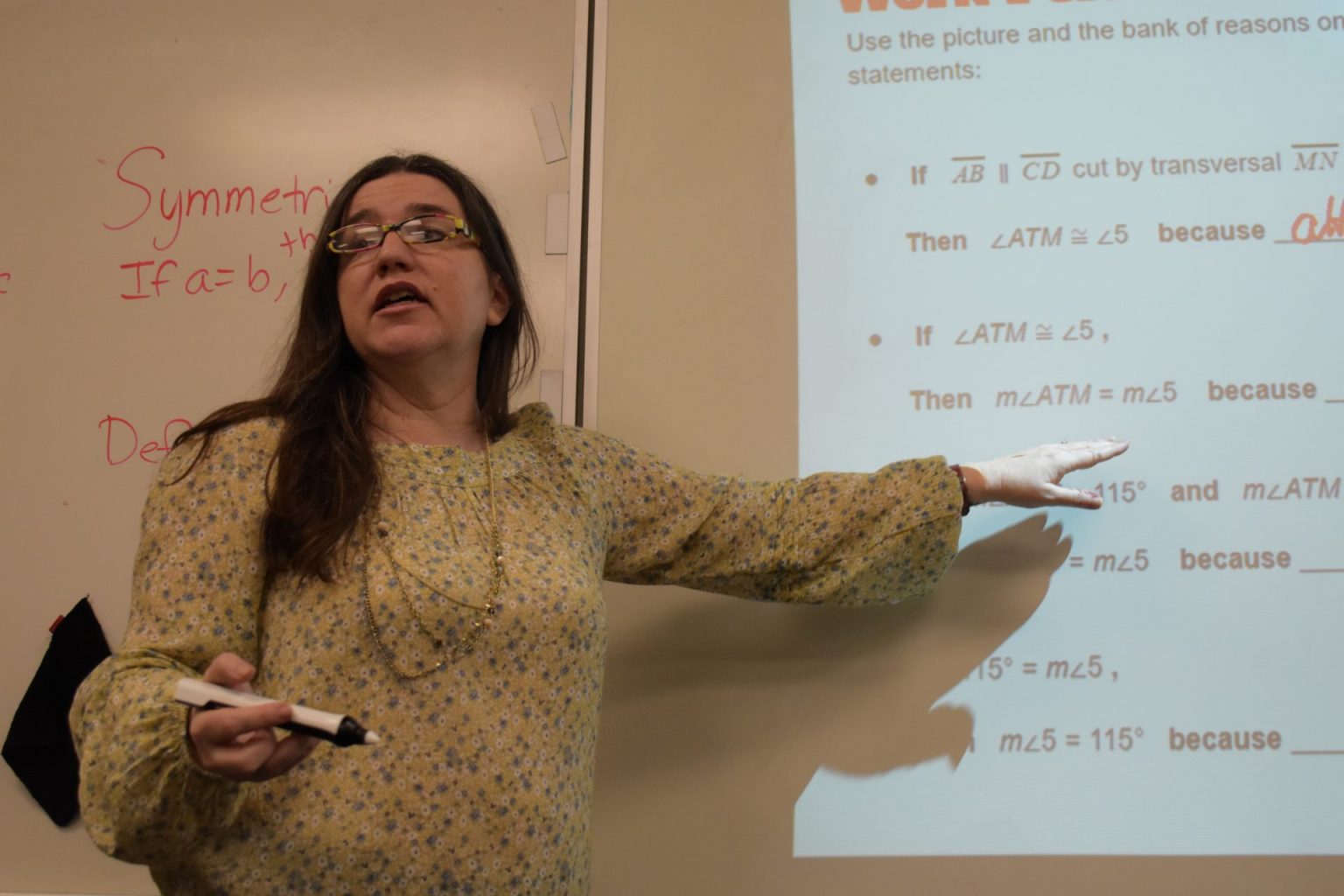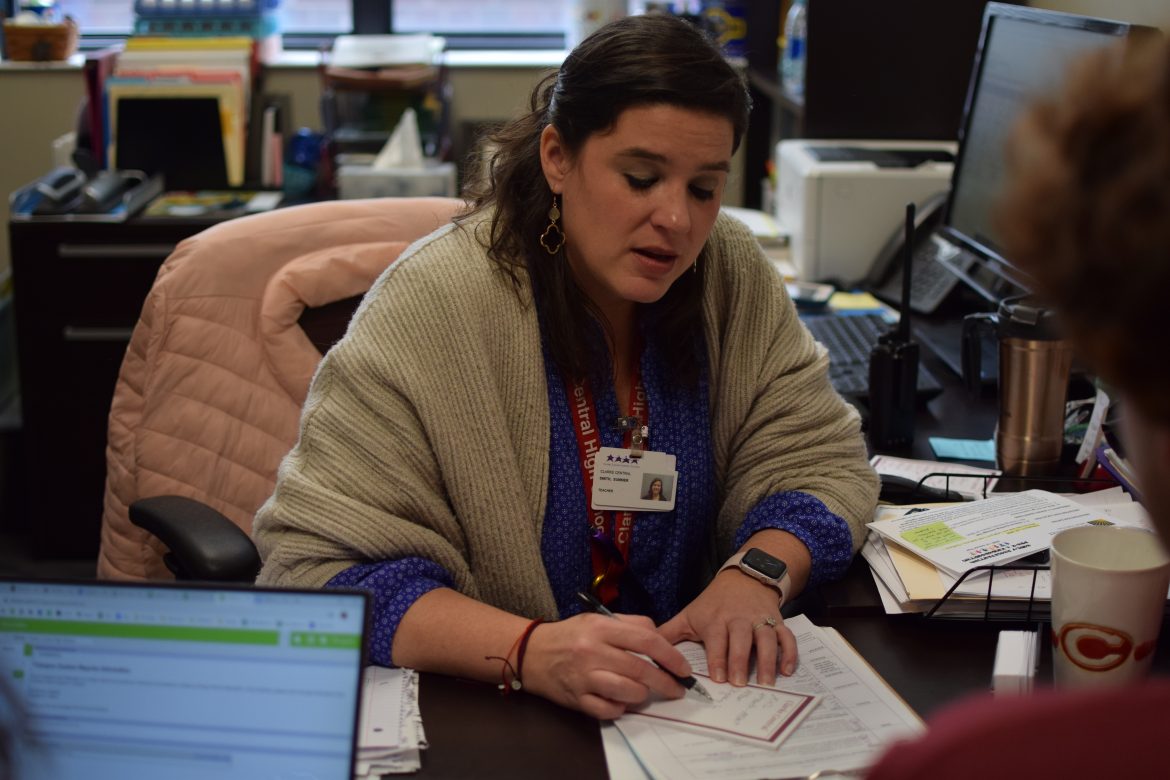Clarke Central High School Assistant Principal Summer Smith works with a student in her office. Smith is responsible for creating the school’s bell schedule and class schedule, a task that involves multiple departments. “One of the biggest hurdles is the actual bell schedule itself and you want to think, ‘Oh well, who cares? Like you just write down some numbers and pick the times.’ But transportation has to be involved because you have to coordinate buses. So if we start earlier or later, which probably would start later, obviously, we go to school at 8:45. But if you start earlier you’ve got to talk to transportation about can they get students here at that time. We have to talk to food and nutrition about breakfast because that changes their hours,” Smith said. Photo by Naomi Hendershot
In January, the Clarke County School District announced that its high schools will switch to a block schedule, starting in the 2020-21 school year.
The Clarke County School District decided on Jan. 15 the plan to change the Clarke Central High School and Cedar Shoals High School schedules from a seven-period schedule to a four-by-four block schedule. This schedule will be implemented at the start of the 2020-21 school year.
“The district is looking at making that change for a couple of reasons. The largest is student load,” CCHS Assistant Principal Summer Smith said. “We were starting to see a lot of student health issues, mental health issues, even physical health issues. We don’t have lockers, and (students) tote around big, massive books for seven classes. So that’s kind of where the conversation got started.”

Clarke Central High School sophomore Yamileth Alejandro works on a worksheet in class on Jan. 31. Alejandro has had experience with block schedule, which she believes gives students an opportunity to stay on top of their work. “I feel like (our current schedule is) really stressful for kids, especially if they’re not caught up with their classes,” Alejandro said. “ And it’s like, you have more work (on top of) the one that you don’t already have (done).” Photo by Gerardo Navarro
With a four-by-four block schedule, students will attend four classes every day for 90 minutes each during the first semester, and then complete the second set of four classes during the second semester. CCHS sophomore Yamileth Alejandro experienced block scheduling at Rockdale County High School (RCHS) before attending CCHS and believes the switch will be beneficial for students.
“For the semester I was over (at RCHS), I feel like it was a good scheduling (system) due to the fact that you have more time to do your work. You were able to do more activities and enter sports and stuff like that due to you (being able to get) your work done in that same class period, and you don’t have to worry about it after school or anything,” Alejandro said.
Associate Principal Reginald Thomas worked on a block schedule as a social studies department teacher and is looking forward to the switchback.
“As a teacher, (only having) three classes gives you (an) opportunity to do more things. When I was finishing up my career teaching, I was (teaching Advanced Placement) United States government,” Thomas said. “(Block schedule) was beneficial from one perspective because it gave us time to have a lot of discussions and get a lot of things done.”
With the new schedule, the graduation requirement will continue to be 24 credits, according to CCHS school counselor Angelia Bruce. Because students will be engaging in eight classes per year compared to seven, this may create more flexibility within student schedules.
“(Moving to block schedule) means that there are going to be more opportunities for students to finish early, potentially, but we don’t know what that looks like in terms of (CCSD) policy about early graduation or modified days or anything like that.”
— Angelia Bruce,
CCHS school counselor
“(Moving to block schedule) means that there are going to be more opportunities for students to finish early, potentially, but we don’t know what that looks like in terms of (CCSD) policy about early graduation or modified days or anything like that. So, at this point, all we know is that it means more electives that students will have to take,” Bruce said. “One of the things that will be nice about (keeping the graduation requirement the same) is that students will have more opportunities to get made up on credits if they fall behind.”
According to CCHS band director Christopher Simpson, block schedule will reduce the educational experience of fine arts classes because these courses rely on year-long practice.
“I think that the thing that has allowed the fine arts programs — orchestra, choir, digital media, art, band (and) drama — to be successful at Clarke Central has been a schedule that has allowed kids to be in classes that’s going to make them successful,” Simpson said.
CCHS junior Madison Bannister dual enrolls at the Athens Community Career Academy (ACCA) and is concerned about how AP classes, academic internships and dual enrollment will be implemented into the new scheduling format given their extra time commitment.
“I’m scared that (block schedule) will limit the amount of classes I can take (without them interfering) with my high school classes,” Bannister said. “Also the social aspect, like I might not come into school (on time) or have lunch with my friends anymore.”
According to Smith, when CCHS was on block schedule in the past, some AP classes required students to first take a prerequisite course in the fall in order to fully engage with all of the course material.
“(Students) can take advanced biology II in the fall and then pair it with AP biology, which would allow you to have more exposure to content and then really hit your AP class (in the spring),” Smith said. “The problem is that you can’t do that for everything because you’ve only got eight slots, and your AP kids are typically kids who have very specialized needs, and so you have to decide then which classes really need to meet year-long, if any, and then how to make that happen.”

Clarke Central High School math department teacher Heather Julian explains a problem to her class on Jan 31. Julian believes that both students and teachers will have trouble focusing and staying engaged during a 90 minute class period. “90 minutes is a long time to be in a classroom. I’ll also say that I said it was nine years ago that we were on block last time, and cell phones were not an issue then. We didn’t have smart-phones. I mean, MP3 players (were) the biggest disruption. So I feel like that with technology over the last nine years, both teachers and students have a shorter attention span,” Julian said. Photo by Gerardo Navarro
Math department chair and advisement co-chair Heather Julian feels that block schedule may
pose difficulties for maintaining restorative justice practices in advisement.
“With the community building circles, I know a lot of advisements have really grown closer together. There are less cliques in their advisements because they’re doing the circle,” Julian said. “I am concerned that we will lose the momentum that we’ve gotten in building that community because I have no idea what the bell schedule looks like, so I just hope that (it) is still an important part of our week.”
Julian has worked on a variety of schedules in her 15 years of teaching, including on a block schedule, and prefers teaching on CCHS’ current seven-period schedule
“I like that there are short days, (and) I like that there are long days because I can do different kinds of activities. I like the year-long schedule, because I think that it takes time to process math, and so you have that time in between classes to let your brain process that,” Julian said. “I also feel like I know my students better because I have a whole year with them, and so I feel like I’ve been able to connect more with them.”
CCHS junior Beyonce Neal likes the seven-period rotating schedule, due to the daily variation in classes and class length.
“I don’t really understand (block scheduling) because I don’t know what it’d be like changing every semester, and it’s four classes (in a single semester), and then you’re gonna have to stay in there for an hour and 30 minutes,” Neal said.
According to an article published by professors at the University of Memphis, a seven-period schedule is not beneficial for students due to a lack of time to fully explain lessons and homework. During her time as a student teacher, English department teacher Grace Crumpton taught on a block schedule and agrees with this sentiment.
“I liked (block schedule) a lot because there (was) so much more that I could do with fewer classes and students to manage. I could give more personalized instruction because I had more time to get to know my kids quicker and fewer kids to get to know,” Crumpton said.
Associate Principal Dr. Linda Boza has had five children attend CCHS, some during block scheduling and some during the seven-period day. According to Boza, the block schedule reduced stress-levels for her children.
“My children who were (on) block schedule had less stress, especially where AP classes were concerned, because you could balance them. For example, if you wanted to take four (AP classes) in a year, you could do two in the fall and two in the spring,” Boza said. “But a child of mine who decided to take five (AP classes with a seven-period schedule), they were hanging over her all year long and I would say there’s an element of stress there.”
“(You take five in (a) semester, and so it’s unrealistic and not helpful to have kids who we want to get ready for college on a schedule that isn’t anything like a college schedule.”
— Grace Crumpton,
English department teacher
Crumpton also believes that switching to block will allow students to experience a schedule similar to one they would experience at college.
“(For) my advanced classes, I’ve been talking to them a lot about how to prepare for college and what to expect, (and) you don’t take seven classes in a day when you’re in college,” Crumpton said. “You take five in (a) semester, and so it’s unrealistic and not helpful to have kids who we want to get ready for college on a schedule that isn’t anything like a college schedule.”
Math department teacher Lindy Tickerhoof has taught at a variety of high schools in Georgia during her 29-year career. She has taught mainly on a six-period schedule and is still unsure about her feelings on transitioning to a block schedule.
“I think that having the extra time would be good, but I think it would be really hard, especially in math, to use that extra time to actually teach two days worth of lessons in one day. Because that’s basically what you’d have to do — you split the semester in half,” Tickerhoof said. “I might be wrong because I’ve never done it, so I might end up liking it.”
As CCHS prepares to move to a block schedule for the upcoming school year, Boza believes the change will require a transitional period for students and teachers to adapt to the new school day.
“As with any schedule change, I think that there will be pros and cons. We used to be on the four-by-four (block schedule), and a lot of people didn’t want to leave it. And, interestingly enough, I think some of the very people who didn’t want to leave it now don’t want to go back,” Boza said. “I think no matter what schedule we (choose), there will be people who don’t like it and people who do.”
Story by Maya Cornish
Package by Ireland McCage
